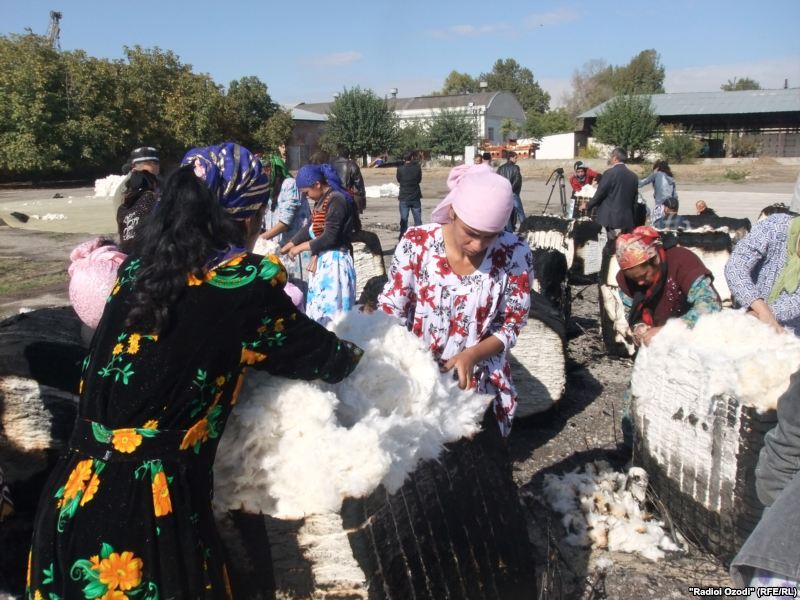
Arson Attack Targets Prominent Tajik Cleric’s Cotton Plant
Publication: Eurasia Daily Monitor Volume: 8 Issue: 202
By:

Arson is believed to be the cause of a fire on October 24 that damaged a cotton-processing plant belonging to Hoji Akbar Turajonzoda, a prominent Tajik religious and political figure, in the town of Vahdat, some 30 kilometers east of the Tajik capital Dushanbe. The fire broke out early in the morning. The local firefighters kept the blaze from spreading to barns where processed cotton was kept. Some 600 bales of cotton were fully or partially destroyed, with damages estimated at about $200,000. A plastic tank containing gasoline was found at the site of the blaze, suggesting that the fire was not accidental (www.news.tj, www.rferl.org, October 24).
Speaking to journalists after the blaze, Turajonzoda said he did not know whether the reason for the arson attack was economic or political. “I do not know whom to blame,” he said adding, “I would rule out economic motives because I do not have conflict with anybody. Speaking about political motives, I do not want to believe that political enmity can take such ugly forms in our country. If this is about politics, it is very sad” (www.ozodi.org, October 24).
The fire could be an attempt to intimidate Turajonzoda who has recently gathered significant political clout by speaking openly against the government’s policy on religion. Turajonzoda’s background is important for understanding why his criticism has been taken very seriously, both by the government and the public. He comes from a prominent religious family and, during the Soviet era, he received rigorous religious training both at home and in Jordan. In 1988, Turajonzoda was appointed as Tajikistan’s supreme religious authority, the Qazi-kalon. After the beginning of the civil war in 1992, he fled the country and became the second most senior leader of the United Tajik Opposition (UTO), a coalition of Islamic and democratic forces that fought against the government of President Emomali Rahmon.
As the war ended, Rahmon made Turajonzoda first deputy prime minister in his government. An August 7, 2009 cable from the US embassy in Dushanbe, disclosed recently by WikiLeaks, describes the appointment as the result of a “gentlemen’s agreement” between Turajonzoda and the Tajik president: in exchange for the post, Turajonzoda agreed that he would not challenge Rahmon for the presidency (www.wikileaks.org/cable/2009/08/09DUSHANBE957.html). Hence, the cleric publicly denounced the Islamic Revival Party (IRPT) and supported Rahmon in the 1999 presidential election.
Turajonzoda rarely censured state policies during his seven years on the “president’s team.” In 2005, however, Rahmon removed him from the government by appointing Turajonzoda to the upper chamber of the country’s parliament. Given that the parliament has only a nominal role in the Tajik political system, the appointment was expected to lead to Turajonzoda’s gradual and quiet retirement from politics. However, after becoming a senator, Turajonzoda turned openly critical of the government’s increasingly restrictive religion policy. He has strongly denounced the closure and demolition of “illegal” mosques all over the country. His harshest criticism so far has been aimed at the 2009 religion law and the recently enacted parental responsibility law, which, according to Turajonzoda, is “openly against God and Islam.” Turajonzoda has claimed that the authorities’ efforts to restrict Islamic expression in the country are more oppressive than in the officially atheist Soviet Union (EDM, June 28).
By speaking out openly against the authorities, Turajonzoda has effectively put an end to his political career under the incumbent president. After the 2010 elections, Rahmon did not reappoint him to the parliament. Instead, government-owned newspapers launched a smear campaign against Turajonzoda, denouncing him as a backward cleric and an “enemy” of the country (www.news.tj, September 15, 2010). The authorities also ordered that the country’s Internet providers block Turajonzoda’s religious website (www.news.tj, May 25, 2011).
Furthermore, the government has increased pressure on Turajonzoda’s elder brother, Nuriddin (aka Eshoni Nuriddin), who has been one of the most popular imams (mosque leaders) in the country. His mosque in the village of Turkobod, near Vahdat, frequently gathered more people for Friday prayers than Dushanbe’s major mosques. Similar to his brother, Nuriddin has been known for his public criticism of the government, for which he was repeatedly reproved by Tajik security agencies. The growing pressure by the authorities led Nuriddin to resign as imam in January (EDM, March 3, 2011).
It is possible to draw parallels between the arson attack against Turajonzoda’s plant and the fire that destroyed a prayer venue in the IRPT’s headquarters in Dushanbe last year. Prior to the incident, state officials criticized the party for running an “unapproved mosque” and allowing women to pray at the venue in violation of an official ban on women in mosques. On October 22, 2010, police raided the IRPT headquarters, disrupting Friday prayers and seizing computer hard drives and literature. A fire broke out the next day, destroying the prayer venue (www.news.tj, October 24, 2010). The IRPT leaders believed the fire was caused by arson, but they had not openly blamed the authorities. It is likely that Turajonzoda has chosen to do the same: he would not blame anybody for the arson attack but would take it as a political warning.




